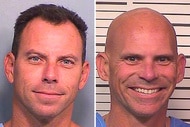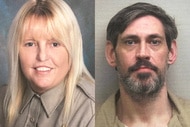Create a free profile to get unlimited access to exclusive videos, breaking news, sweepstakes, and more!
British Olympic Star Sir Mo Farah Reveals He Was Child Trafficking Victim In New Documentary
"For years I just kept blocking it out," Olympic medalist Sir Mo Farah said of his experience being the victim of human trafficking as a kid. "But you can only block it out for so long."

Sir Mo Farah, the four-time British Olympic champion runner, has admitted to being childhood victim of human trafficking in a new documentary airing this week.
The 39-year-old, who says his given name was Hussein Abdi Kahin, recently revealed in an interview that he was smuggled into the U.K. by human traffickers and was forced into child labor at the age of nine.
"For years I just kept blocking it out," Farah told a BBC film crew in the new documentary “The Real Mo Farah,” which premieres Wednesday. "But you can only block it out for so long."
Farah had previously said that he and his parents came as refugees to the U.K. However, the long distance runner admitted in the new documentary that his biological parents had never been to Britain.
“Despite what I’ve said in the past, my parents never lived in the U.K.,” Farah told the BBC. “When I was four, my dad was killed in a civil war. As a family, we were torn apart. I was separated from my mother and I was brought into the U.K. illegally, under the name of another child called Mohamed Farah.”
The Olympic athlete explained that his surviving family — including his mother and a pair of brothers — currently reside on a farm in the self-governing region of Somaliland in the Horn of Africa, north of Somalia. (The area declared independence in 1991, but is not an internationally recognized nation.) Farah said his father was killed by a stray bullet during a civil uprising when he was just a toddler.
In the documentary, Farah recounts how, at the the age of eight or nine, he was taken from his home to stay with family in Djibouti, a small nation northwest of Somaliland. According to the Olympic athlete, he was later flown to Britain with a woman and non-relative previously unknown to him.
The woman told him he was being taken to Europe to stay with other members of his extended family, a prospect which Farah then-recalled, “excited” him.
"I'd never been on a plane before," Farah said.
However, after arriving in the U.K., Farah was taken by the woman to west London where he was forced to perform daily housework and childcare. The stranger threatened to withhold food if he refused, he said, and tore up the paper with his relatives' supposed contact information in front of him.
"If you ever want to see your family again, don't say anything," Farah recounted the woman telling him. "Often I would just lock myself in the bathroom and cry. So after I while, I just learned not to have that emotion.”
The family initially denied Farah access to education, he said, but ultimately permitted him to attend school at the age of 12. School staff were reportedly told he was a Somalian refugee. Farah’s former tutor Sarah Rennie described him at the time as “unkempt and uncared for,” and “emotionally and culturally alienated” child. He spoke little English.
As a young man, Farah found solace in spending time at his school’s track. His natural ability as a long-distance runner would later prove key in propelling him out of a life of being trafficked.
"The only language he seemed to understand was the language of P.E. and sport," Alan Watkinson, Farah’s gym teacher, told the BBC.
Farah, who eventually confessed his true identity to Watkinson, was re-homed with a new family of Somali origin after his mentor contacted social services.
"I still missed my real family, but from that moment everything got better," he added. "I felt like a lot of stuff was lifted off my shoulders, and I felt like me. That's when Mo came out — the real Mo."
“The Real Mo Farah” also features footage of the doctored visa documents in another child’s name used to illegally smuggle Farah into the U.K. Farah said he's speaking up about his trauma now to raise more awareness surrounding the plight of human trafficking — and to prevent others from being victimized.
"I know I've taken someone else's place,” Farah said. “And I do wonder, what is Mohammed doing now?"
Farah won gold medals in both the 5,000-meter and 10,000-meter competitions at the 2012 and 2016 Olympic Games. He’s the most successful British track athlete in modern history, according to his website.
“The Real Mo Farah” will premiere on BBC on Wednesday. The film was produced in conjunction with Red Bull Studios.























